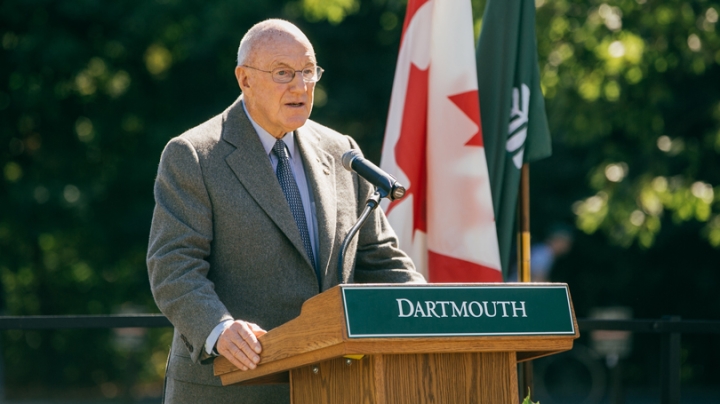On Friday, at an outdoor celebration under sunny skies, President Phil Hanlon ’77 spoke about the historic launch of Dartmouth’s ambitious new center for teaching and research: The Arthur L. Irving Institute for Energy and Society.
Attending the event were Arthur Irving, chairman of Canadian-based Irving Oil, his wife, Sandra, and their daughter, Sarah ’10 Tuck ’14. The Irvings, along with Irving Oil and the Arthur L. Irving Family Foundation, have donated $80 million to start the institute bearing their name. Also at the celebration were more than 200 people, including faculty, students, Irving Oil representatives and other Irving family members.
“This is truly an historic day for our campus,” President Hanlon told the gathering. The world needs multi-faceted solutions to its energy problems, he said. “The Arthur L. Irving Institute for Energy and Society at Dartmouth will approach this issue from all perspectives, applying a liberal arts approach to solutions that look not just at science or engineering or policy, but at the impact of energy-related decisions on all our human systems: environmental, societal, political, and financial.”
Hanlon recalled how the idea for an institute grew out of conversations he and his wife, Gail Gentes, had with Arthur and Sandra Irving while visiting them three years ago at their retreat in the woods of New Brunswick, Canada.
Arthur Irving said he was excited about the future of the institute.
“I know, when I stand here at Dartmouth, that what we are going to do, and will do, is the right thing,” he said.
Sarah Irving spoke warmly about her father, “a man whose vision for his company is always one of doing the right thing—taking care of our people, protecting the natural environment and making this world a better place.” Arthur Irving, she said, “is passionate about life, and being here today to celebrate that and the opportunities this institute will present for generations to come is very special.”
The Irving Institute will be housed in an energy-efficient building that will be located between Thayer School of Engineering and the Tuck School of Business, placing it in proximity to innovative activities at the two schools and creating a point of convergence for faculty and students from around campus. Undergraduate and graduate students will work there alongside faculty and post-doctoral fellows to tackle global challenges related to energy and sustainability.
A track record in collaboration is what makes Dartmouth an ideal setting for that work, said Christopher Levey, associate professor of engineering at Thayer.
“We need a team that includes our colleagues at Tuck, our colleagues in government, in economics, sociology, anthropology, policy studies, environmental studies, sustainability—we need the works, and it’s exactly that sort of group that the Arthur L. Irving Institute for Energy and Society is designed to bring together,” said Levey.
Viveka Ranjitsinh, Tuck ’17, talked about the importance of energy research by recalling a girl she had met in a rural town in India. The 9-year-old could not do homework at night because her home didn’t have electricity. “That encounter opened my eyes to the energy crisis that pervades so much of our world today,” said Ranjitsinh. “How amazing it will be to work at an institute that will help solve the problems of tomorrow.”
In addition to Irving Oil, the family, and their foundation, several other donors have contributed to the institute. At the end of the ceremony, Bill Helman ’80, chair of the College board of trustees, thanked the donors—Judith M. and Russell L. Carson ’65 and Cecily M. Carson ’95; Kathryn and Richard Kimball ’78; Kristin and John Replogle ’88; and Lori Weinstein and Martin J. Weinstein ’81. Along with an anonymous donor, they have contributed $33 million, bringing the total raised to $113 million. The College plans to raise a total of $160 million to fund the project.
